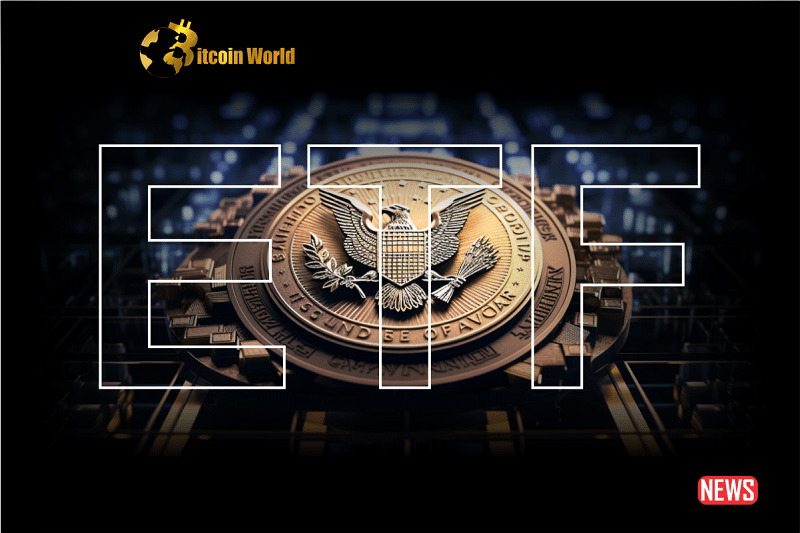Frustrated by the wait for a Bitcoin ETF in the US? You’re not alone. The Securities and Exchange Commission (SEC) has once again pumped the brakes on the approval process, this time affecting applications from prominent players like Valkyrie, WisdomTree, and Invesco. For crypto enthusiasts and potential investors, this news brings a familiar mix of disappointment and a continued state of regulatory limbo. Let’s unpack what this delay means and why the SEC remains so cautious.
Another Delay? What’s the Big Deal?
For those who’ve been following the Bitcoin ETF saga, this delay might feel like déjà vu. However, it underscores a critical point: the SEC isn’t rushing into approving these investment vehicles. Think of it like this:
- Investor Protection First: The SEC’s primary concern is safeguarding investors. They want to ensure the market is robust and resistant to manipulation before giving the green light to Bitcoin ETFs.
- Market Maturity Still in Question: Despite Bitcoin’s growth, the SEC likely still sees aspects of the cryptocurrency market that require further scrutiny.
- Setting a Precedent: Approving a Bitcoin ETF would be a significant step, and the SEC wants to ensure they get it right.
This cautious approach contrasts sharply with countries like Canada, where Bitcoin ETFs have been trading for some time. This naturally leads to the question:
When Will the US Join the Bitcoin ETF Party?
That’s the million-dollar question, isn’t it? While there’s no definitive answer, the SEC’s continued delays suggest they aren’t yet convinced the market is ready. This impacts both individual and institutional investors. Currently, those looking to invest in Bitcoin through traditional means are often left with less straightforward options.
What Are the Implications of This Delay?
The SEC’s decision has several key consequences:
- Limited Access for Mainstream Investors: Many investors prefer the regulated environment of ETFs. The absence of a Bitcoin ETF keeps them on the sidelines or forces them into potentially riskier alternatives.
- Continued Reliance on Indirect Exposure: Investors might turn to publicly traded companies with Bitcoin holdings or other indirect methods, which may not offer the same direct exposure and benefits as an ETF.
- Frustration for the Industry: Companies like Valkyrie, WisdomTree, and Invesco have invested significant resources in these applications. Delays create uncertainty and can hinder innovation.
Why Are Bitcoin ETFs So Desirable Anyway?
You might be wondering what all the fuss is about. Why are Bitcoin ETFs so sought after? Here are a few key reasons:
- Simplified Investment: ETFs trade on traditional stock exchanges, making it easier for investors to buy and sell Bitcoin without needing to navigate crypto exchanges or manage private keys.
- Increased Accessibility: Bitcoin ETFs can be included in traditional brokerage accounts, opening up Bitcoin investment to a wider audience.
- Potential for Institutional Adoption: Many institutional investors are restricted from directly holding Bitcoin but could invest through a regulated ETF.
- Enhanced Security: The ETF provider handles the complexities of storing and securing the underlying Bitcoin.
The Waiting Game: What’s Next?
For now, the industry remains in a holding pattern. All eyes are on the SEC and their next move. Will they eventually approve a Bitcoin ETF? It seems likely, but the timeline remains unclear. In the meantime, companies like Valkyrie, WisdomTree, and Invesco will likely continue to refine their applications and address the SEC’s concerns.
Key Takeaways:
- The SEC has extended the review period for Bitcoin ETF applications from Valkyrie, WisdomTree, and Invesco.
- This highlights the SEC’s cautious approach to regulating the cryptocurrency market.
- The delay limits access to Bitcoin investment for many mainstream and institutional investors.
- Bitcoin ETFs are desirable due to their simplicity, accessibility, and potential for increased security.
- The future of Bitcoin ETFs in the US remains uncertain, with the industry awaiting the SEC’s next move.
The journey towards a Bitcoin ETF in the US is proving to be a marathon, not a sprint. While the latest delays may be disappointing, they underscore the importance of regulatory diligence in this evolving financial landscape. The question isn’t if a Bitcoin ETF will eventually be approved, but rather when, and under what conditions. Stay tuned – this story is far from over.
Disclaimer: The information provided is not trading advice, Bitcoinworld.co.in holds no liability for any investments made based on the information provided on this page. We strongly recommend independent research and/or consultation with a qualified professional before making any investment decisions.


